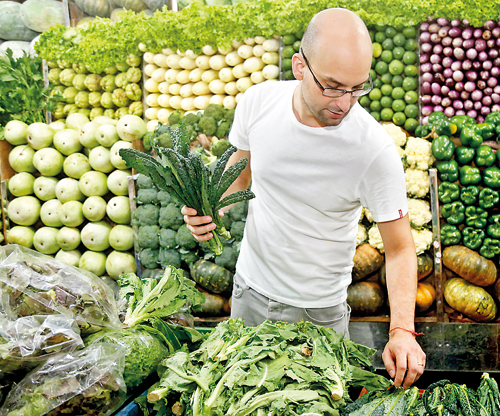Finding the true essence of food in people and culture

Taking his pick: Chef Ivan at the Kollupitiya market. Pix by M.A. Pushpa Kumara
The bustling Kollupitiya market is where we meet Brazilian chef Ivan Brehm as he critically inspects the fresh produce available there. Arriving in Colombo last month, Ivan whipped up two exclusive meals for local patrons on June 20 and 21 at The Grill restaurant at the Kingsbury Hotel.
Brehm is just one of the many celebrity guest chefs invited by Colombo Supper Club (CSC), an initiative spearheaded by Singaporean Naserah Tybally.
Chef Ivan’s resume is impressive: Having trained with culinary genius Heston Blumenthal at the three Michelin Star awarded UK based restaurant “The Fat Duck”, he went on to head kitchens around the world, being awarded Chef of the Year by the World Series in 2015 before taking Bacchanalia, Singapore to its first Michelin star as its Executive Chef.
At the Kingsbury dinners Chef Ivan gave customers a sensory exploration of his signature style of “crossroads cuisine”. This is the culinary culture he presents at his own restaurant ‘Nouri’ which opened its doors to Singaporean patrons in June 2017. Nouri, a word rooted from the Latin word for “Nourishment”, draws its inspiration from global cuisines highlighting the cross-cultural similarities and connections people share, irrespective of background.
Chef Ivan stands firm in his philosophy which he serves hot to us whilst among the vendors and buyers of the Colombo market.
“Culture is a reflection of people’s interactions with their spaces,” he says philosophically. “Food is a cumulative story of the people that went into harvesting and growing the food.”
Glancing around the Kollupitiya market he grins, “90 percent of the produce in the market isn’t what came from here.” “When you think of cuisine there isn’t a thing called British, there isn’t a thing called French. I want to create inclusive food.”
His craft was greatly influenced by his aunts, grandmothers and mother and much like his food philosophy, Ivan himself comes from a multicultural lineage. A Brazilian native he describes himself as “a product of a divorce”. Having had to travel from one parent’s house to another between states, Ivan shares, “Something I noticed from a young age was that food connected us all.” He adds “During the process of growing up the real parts where I saw people together were during meals.”
Revealing that he once planned on going to law school, he decided instead to choose a calling where he can “make good food and make people happy”. “That’s what the world of food meant to me – a focus on culture and relationships.”
Ivan paints an image of what can be visually coined crossroads cuisine. “Just imagine a European guy with his suit and tie and an Australian Aboriginal man happily sharing a meal whilst clinking glasses – that’s crossroads cuisine.”
Although not speaking a word of Sinhala, Chef Ivan seemed attuned to non-verbally communicating with the vendors at the market. “You have to stay present and stay engaged with the people selling the produce,” he says, adding that until he flies down to a country he has to creatively find menu alternatives based on what produce is available at the time allowing him to further explore the markets.
Vacationing in Sri Lanka three years back with his wife to “check out the tea country” as tea is one of his passions, having explored the upcountry he jovially recalls how they decided to hitch-hike their way to Kandy. From that visit, he remembers a “spicy- sour chicken curry” (the name of which he cannot recall).
The interpersonal culture of the hospitality in Sri Lanka which he likens to the environment in Indonesia is the atmosphere he attempts to emulate in his restaurant. “The people are genuinely happy to receive you and act like they really want you there,” he muses adding that this anthropological moment is what ties up his philosophy that “people and culture truly are the essence of good food”.


